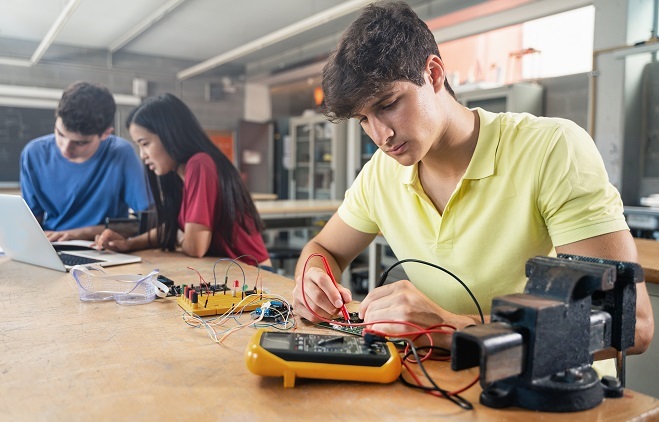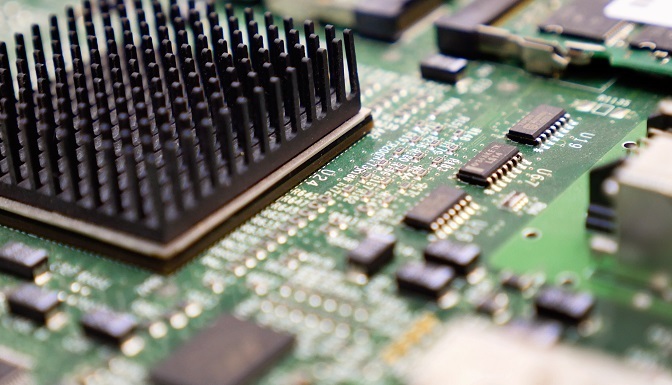
 Data Structure
Data Structure Networking
Networking RDBMS
RDBMS Operating System
Operating System Java
Java MS Excel
MS Excel iOS
iOS HTML
HTML CSS
CSS Android
Android Python
Python C Programming
C Programming C++
C++ C#
C# MongoDB
MongoDB MySQL
MySQL Javascript
Javascript PHP
PHP
- Selected Reading
- UPSC IAS Exams Notes
- Developer's Best Practices
- Questions and Answers
- Effective Resume Writing
- HR Interview Questions
- Computer Glossary
- Who is Who
What is the full form of EEE?
Overview of EEE
Electrical and Electronics Engineering (EEE) is a field of engineering that deals with the examination and alertness of power, electronics, and electromagnetism.

It includes designing, developing, and maintaining electric and electronic systems, equipment, and devices. EEE is a huge field that covers a huge range of programs, from power generation and distribution, to telecommunications, control systems, and electronics production.
In EEE, college students study essential ideas including electrical circuits, electromagnetism, digital electronics, manage systems, and communique systems. They also learn how to design and examine electric and digital systems and devices, and the way to use current software programs and equipment for simulation and modelling.
Graduates with a degree in EEE can pursue an expansion of expert paths in industries which include power generation, telecommunications, electronics manufacturing, and automation. They may work as electrical engineers, electronics engineers, manage engineers, device analysts, or studies scientists.
With the increasing demand for sustainable and renewable power, there are also many possibilities for EEE graduates to work in the field of renewable power and green technology.
Core areas of study in EEE
The core areas of examine in Electrical and Electronics Engineering (EEE) consist of
Electric powered Circuits and systems This covers the assessment and design of electric circuits and systems, which include subjects such as circuit idea, network evaluation, and energy electronics.
Electromagnetism This covers the examine electric and magnetic fields and their interaction with substances, consisting of topics such as electromagnetic waves, transmission traces, and antenna design
Digital Electronics and Microprocessors This covers the design and analysis of digital electronic systems and microprocessors, consisting of topics such as digital logic circuits, computer corporation, and embedded systems.
Control systems This covers the design and analysis of systems that manage physical strategies, consisting of topics such as comments control, PID controllers, and device identification.
Power systems This covers the study of electricity technology, transmission, and distribution systems, which include topics such as power electronics, power high-quality, and renewable electricity sources.
Career opportunities in EEE
Graduates with a degree in Electrical and Electronics Engineering (EEE) have a huge range of career opportunities in numerous industries consisting of
Power technology and Distribution EEE graduates can work in the power industry as electric engineers, designing and maintaining power plants, transmission lines, and distribution networks.
Telecommunications EEE graduates can work in the telecommunications industry as electronics engineers, designing and maintaining communication systems, consisting of cellular networks, satellite tv for pc systems, and fibre optic networks.
Electronics production EEE graduates can work in the electronics production industry, designing and trying out electronic components and devices, including computer chips, sensors, and presentations.

Automation and control systems EEE graduates can work in the automation and control systems industry, designing and maintaining systems that manage strategies in industries including production, chemical processing, and transportation.
Renewable power With the increasing demand for sustainable and renewable power sources, EEE graduates can work in the renewable power industry, designing and keeping systems that generate electricity from sources such as solar, wind, and hydroelectricity.
Research and development EEE graduates can work in research and development, developing new technology and products in regions consisting of robotics, artificial intelligence, and nanotechnology.
Importance of EEE in modern society
The importance of Electrical and Electronics Engineering (EEE) in modern-day society cannot be overstated. here are some reasons why EEE is important for modern society
Power technology and Distribution EEE is important for the production and distribution of electrical power. It performs an important role in ensuring that power is generated and delivered to homes, companies, and industries in a secure, reliable, and efficient manner
Telecommunications EEE is important for modern telecommunications systems, consisting of cell networks, satellite tv for pc systems, and fibre optic networks. It allows humans and companies to communicate with each other quickly and efficiently, irrespective of their location.
Electronics production EEE is important for the design and production of electronic components and devices that are used in regular lifestyles, consisting of computer systems, smartphones, televisions, and scientific devices.
Renewable energy EEE is important for the improvement and implementation of renewable energy technology, including solar, wind, and hydro power. It allows us to harness clean and sustainable sources of energy and decrease our dependence on fossil fuels.
Conclusion
In conclusion, Electrical and Electronics Engineering (EEE) is an important field of engineering that performs an important function in modern-day society. It includes the examination and application of power, electronics, and electromagnetism to design, develop, and maintain electric and electronic systems, equipment, and devices.
EEE covers a huge range of programs, from power generation and distribution, to telecommunications, control systems, and electronics production. Graduates with a diploma in EEE have numerous career opportunities in various industries, which includes power, telecommunications, electronics production, automation, renewable energy, and research and development. EEE is important for modern-day society, and its significance will only continue to grow as we are facing new demanding situations and opportunities in the future.
FAQs
Q1. What skills are required for a career in EEE?
Ans: A profession in EEE requires skills in maths, physics, and computer programming, as well as analytical and problem-fixing skills, creativity, and communication skills.
Q2. How can I become an EEE engineer?
Ans: To become an EEE engineer, you need to have a bachelor's degree in electrical and electronics engineering or an associated field. you may also pursue a master's or doctoral degree for advanced research and development opportunities.
Q3. What are the current research areas in EEE?
Ans: Current research areas in EEE consist of renewable power sources, energy electronics, artificial intelligence, robotics, communication systems, and nanotechnology.

